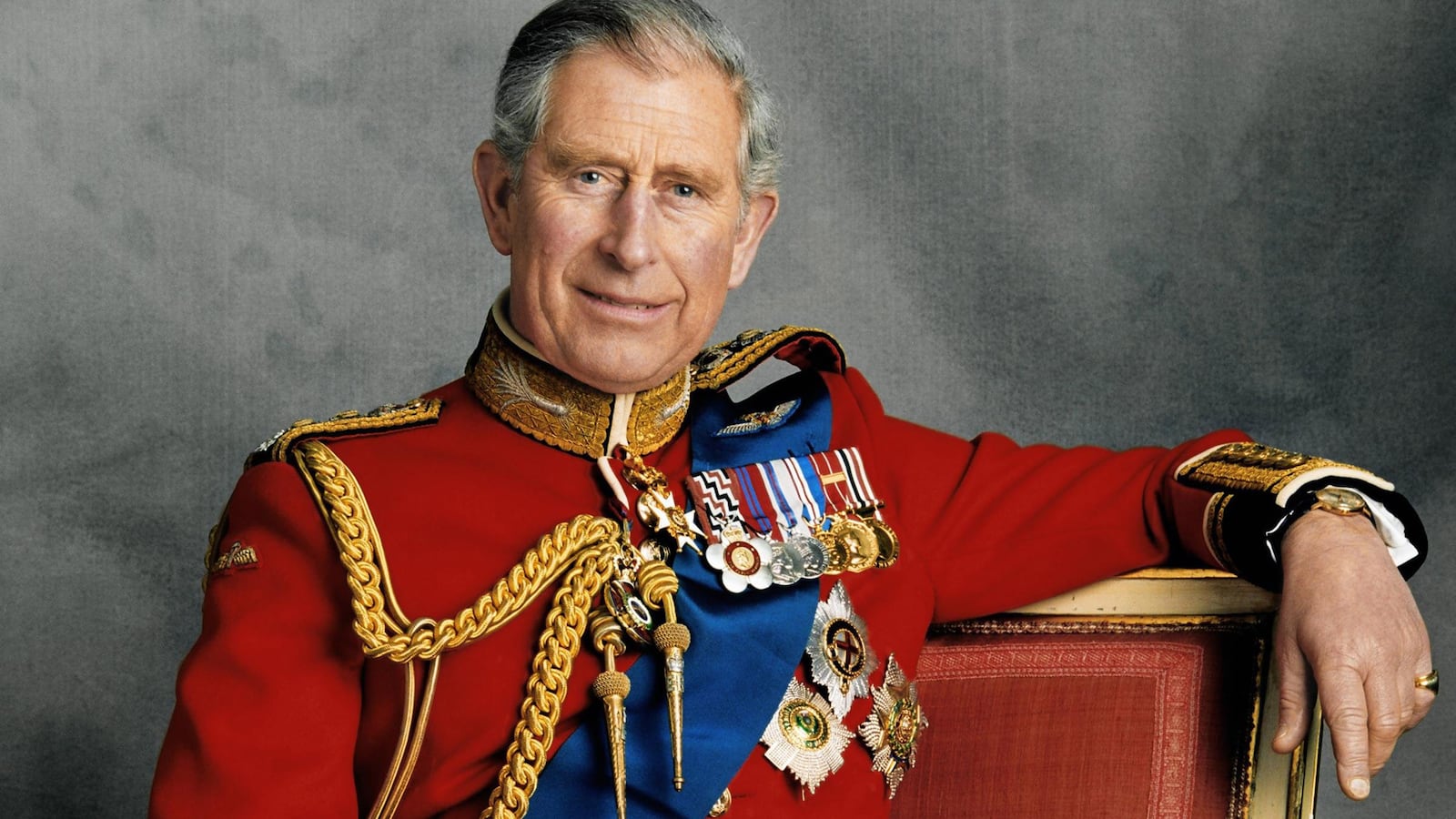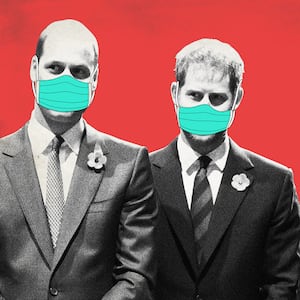If you love The Daily Beast’s royal coverage, then we hope you’ll enjoy The Royalist, a members-only series for Beast Inside. Become a member to get it in your inbox on Sunday.
Prince Charles didn’t actually lean into the camera to switch it on and off, like his son Prince Harry did when he sent out a coronavirus-related missive canceling the Invictus Games from quarantine in North America last month.
But Prince Charles’ social media-disseminated selfie video, filmed in splendid isolation from his library at Birkhall (a very lovely home office, as it goes), was a completely new kind of message to the nation and presented a fascinating insight into how Charles may reign when he becomes king.
Charles’ mother has long cultivated an official persona which, while not exactly stony, could also hardly be described as an exercise in touch-feely relatability.
It is a product, of course, of her era; the stiff upper lip attitude, so derided by Meghan Markle, is an article of faith for Her Majesty. It is also an invaluable tool for maintaining impartiality—after all, if you don’t smile at anyone, no-one can complain when you don’t smile at them.
But Charles has always been more forthcoming when it comes to offering up his humanity.
Although he wore a jacket and tie for the message, complete with pocket square, he did not seek to present an image of kingly might. He didn’t, for example, appear to be wearing make-up, and the struggle of fighting even his “mild” case of COVID-19 was clearly etched on his face.
Kings and queens have tended throughout history to seek to portray themselves as invulnerable, even going so far as to depict spears and arrows bouncing off them thanks to divine protection.
This was quite different. Charles admitted that it was a “strange, frustrating and often distressing experience” to be sick and simultaneously separated from loved ones. He allowed his age and to a certain extent his mere human frailty to be on view. He did nothing to hide his physical and mental vulnerability.
On the subject of being so open, Charles’ biographer and trusted confidante, Penny Junor, told The Daily Beast: “That has always been Charles. He has always shown his emotions. He is a very sensitive man; he is quite unlike the rest of the family in that respect. That of course is why he was such a disappointment to his father. Philip couldn’t understand this boy who cried.
“But this vulnerability is absolutely what’s needed at this moment. I felt the clip had all of the right sentiments, he absolutely got the tone right. It was an example of royalty doing very well what it is supposed to do, which is to express the nation’s emotions back to itself. He did it to perfection.”
Sources at the palace, perhaps caught by surprise at the support that has greeted Charles’ message on social media, have, out of respect to the Queen, sought to downplay its significance.
Courtiers told The Daily Beast that the queen will indeed be making a televised address at some point (sources say she will likely make a single televised address shortly after the epidemic hits its peak). Charles’ allies are firmly pointing out that she remains the focal point of national communication.
Insiders also tell The Daily Beast that to understand Charles’ message as a national address would be incorrect, pointing out that it was actually a message of support for one of the charities of which he is patron, Age UK, and that he sends such messages regularly.
However, the truth is that, even if this was primarily intended as a morale-boosting and fundraising message for an individual and highly deserving charity, it was also much more than that.
Partly of course that was simply by virtue of the fact that Charles has been through the illness and come out the other side. Natural human curiosity means that we will continue to be fascinated by the firsthand accounts, and even the general demeanor, of those who have done battle with this terrible illness and emerged, scathed or unscathed.
But Charles did not just promote Age UK. He also consciously used his message to make a wider appeal than simply comforting and reassuring the elderly.
One noticeable, and presumably carefully considered, line was about how non-key workers should respect the rules supermarkets have put in place, reserving some shopping hours for regular health workers.
British newspapers have been reporting avidly on this matter, but with a horrible, shaming tone, seeking effectively to whip up hatred against individuals who flout these rules without knowing a thing about the circumstances of those they are rushing to condemn.
In contrast to the divisive tactics of the media, Charles simply appealed to our better natures as he urged people to respect these set-aside shopping hours, saying of health service staff and volunteers, “It is clearly essential that such key people are treated with special consideration when coming off their exhausting duties and trying to do their shopping, for instance, while having to contend with constant anxiety about their own families and friends.”
Fans of Charles often dispute the charge of dilettantism and elitism leveled against him by saying that, thanks to his extensive charity work with disadvantaged groups, and despite his vast personal wealth, he has a pretty accurate grasp of the issues facing this struggling with poverty.
Certainly, Charles must be the first royal to ever salute the work of shelf-stackers, saying: “In this regard, we also think of all those many shop workers who are toiling as hard as they can throughout each and every night to keep supermarket shelves stocked—a further ‘emergency service’ on which we are all relying.”
It was a thoughtful and clever touch.
It goes without saying that Charles will be the best prepared monarch this country has ever had. His mother inherited the throne so young that he has been heir apparent to the throne since his grandfather died when he was 4. He has even joked about being “impatient.”
The only other person who has had anything like the wait Charles has to get his hands on the reigns of power is Edward VII.
Much as many people assume Charles will be a terrible king, people had little confidence in Edward, Queen Victoria’s eldest son, either.
The reasons for doubt were different—as Prince of Wales, Edward was famously, chiefly, for titanic feats of eating, drinking and gambling, as he struggled to fill his empty days.
When his mother finally died and he inherited the throne in 1901, at the age of 59, the main hope of the establishment was that he wouldn’t ruin too much of his mother’s good work before dying.
In fact, when he did die, just nine years later, he had been such an impactful and transformative monarch that it soon became quite normal to refer to the “Edwardian age” and regard it as one of enlightenment.
He was integral in delivering one of the most important alliances in British military history, the entente cordiale with France, which, in the face of German aggression, brought a lasting end to centuries of Anglo-French rivalry (although rumors persist that the ancient British landowner’s toast, “To Foxhunting, and damnation to the French!” continued to be uttered at royal dining tables well into the 21st century).
Edward, who spoke several European languages, reinvented royal diplomacy, which had fallen into abeyance in the later years of his mother’s reign. He was aided by the fact that he was related to nearly every other European monarch, and thus came to be known as the “uncle of Europe.”
Edward was aided by luck, his reign neatly dodging major wars and ruling at a period of great prosperity for the British Empire.
It remains to be seen if Charles will be so lucky.
But whether or not plague and pestilence are to stalk our lives for the next few decades, Charles’ invested style of communication is, by some margin, more appropriate to the times than the icy froideur of what has, too often, gone before.


